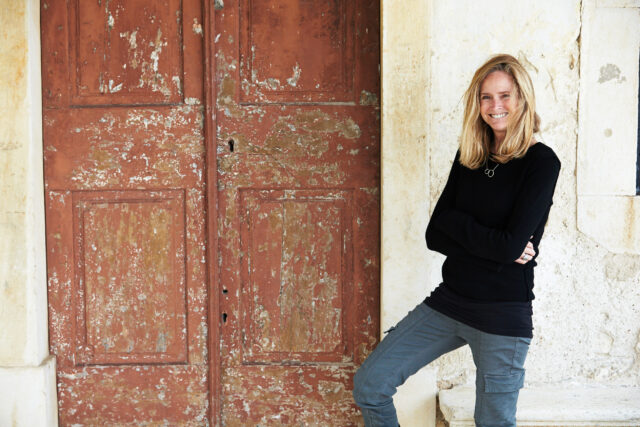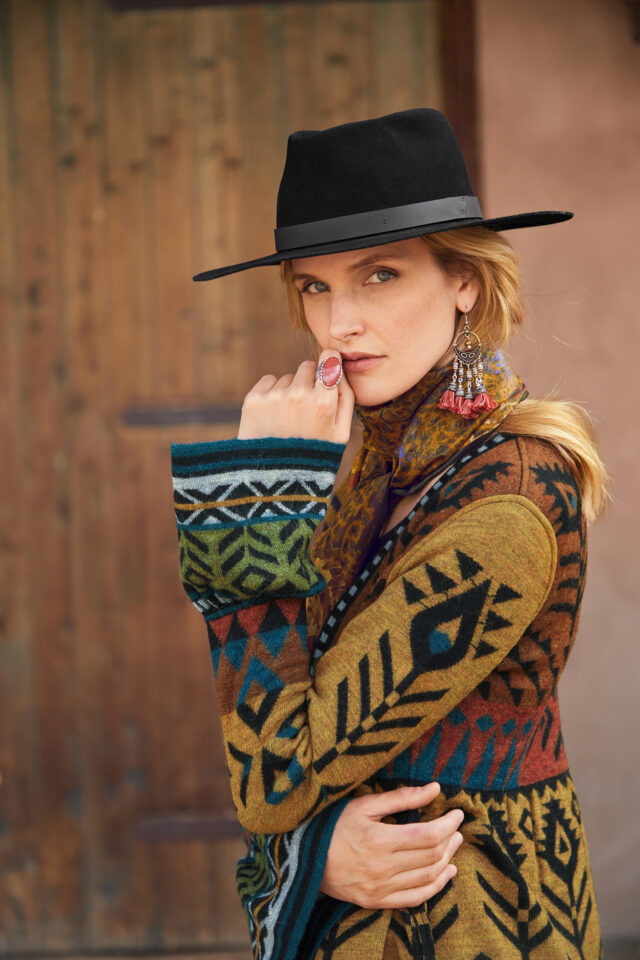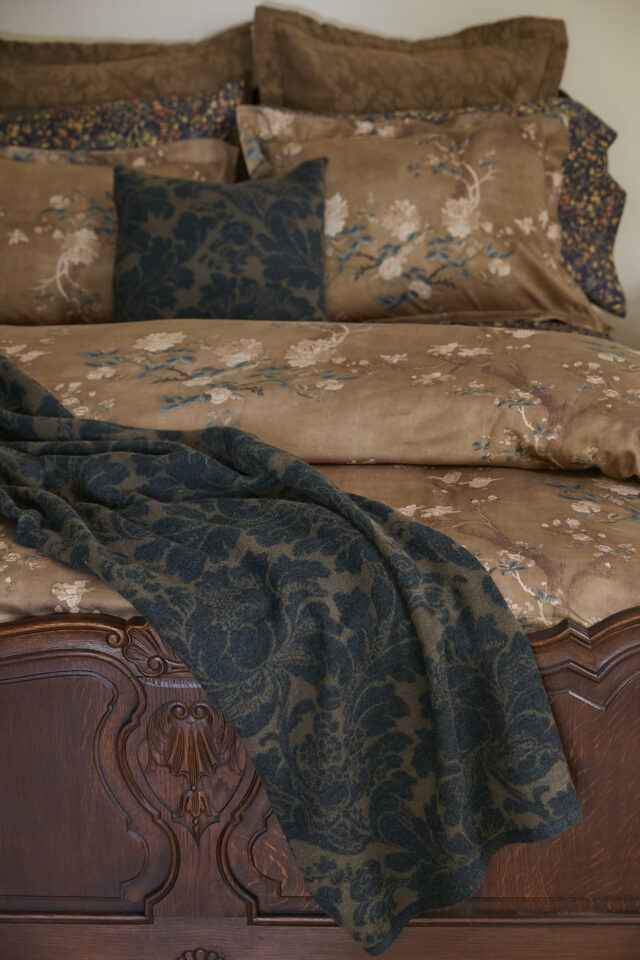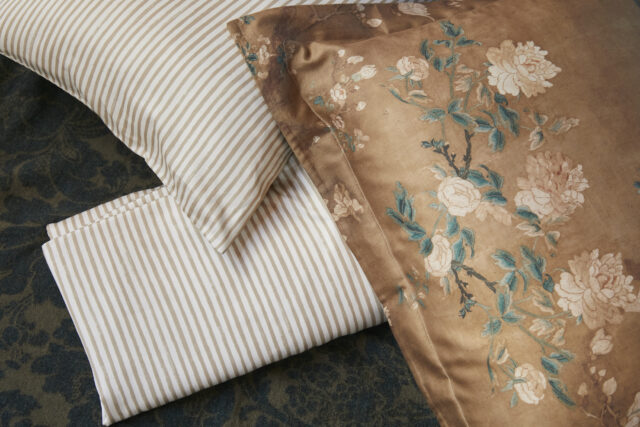
Cristina Cuomo: You originally traveled to Peru as part of an anthropological research project while studying at Yale University. What made you decide to explore this culture?
Annie Hurlbut: It was serendipity. Wanting to do something meaningful the summer after sophomore year, I approached my anthropology professor and asked if he knew of any excavations I might volunteer for over the break. He wrote a friend of his who was excavating pre-Inca material on the coast of Peru. A month later a letter from the friend arrived. The answer was “come on down”, and the rest is history.
CC: What initially attracted you to the handwoven mantas, ponchos and textiles you discovered in the markets of Cuzco, Peru?
AH: Andean textiles are subtle but extremely complex. The shapes are predictably simple: ponchos, women’s shawls, belts and bags. Their beauty lies in the extraordinarily tight spin of the alpaca fiber they are woven from and the complex patterning of the warp yarns. Each village in the Andes has its own recognizable weaving motifs, which remain remarkably consistent through time. The more I learned about this textile tradition the more addicted I became. I spent every cent I had collecting pieces I could afford.
CC: Describe the texture and feel of the Alpaca fiber used in your line. What sets it apart from other materials?
AH: We use nothing but premium grades of alpaca in our knit and woven designs from Peru. The fiber shorn from the animal is sorted into grades depending primarily upon fineness and length. Typically, hair sheared from the back of the animal is the best and from there it is sorted by hand and any course hairs are removed. Alpaca fiber is similar to cashmere in its soft, luxurious feel, but it is stronger, resistant to pilling and lighter in weight for the warmth due to its hollow shaft which provides natural insulation.
CC: What does Peruvian Connection do to honor the indigenous culture of Peru?
AH: The original inspiration for Peruvian Connection was, and remains to this day, the Andean textile tradition. The skills of the artisans we work with, the ethnographic patterning echoed in our collections and the colors we use all emanate from that remarkable tradition.

CC: Tell us about some of the Andean artisans that create pieces for your line.
AH: We work with cottage industries all over the South Andes as well as the coastal city of Lima, which is mostly populated by people who have migrated from the Andes, bringing their knitting and weaving skills with them. We use many different types of production, from hand knitting and hand crochet to highly complex and sophisticated knitting machine production. But even the highly technical pieces in our collection involve skilled machine manipulation and hand finishing, combining old world artistry with modern knitting techniques.
CC: How does your brand participate in fair-trade practices?
AH: Since we began our business almost 45 years ago, we have been steady loyal partners with the cottage industries who produce our products. We have brought great design, expertise, market knowledge and access to sophisticated raw materials they would otherwise not have. They, in turn, have provided extraordinary skill, access to an artisan production without which we wouldn’t be here, and a boundless measure of heart, effort and loyalty. We are true collaborators in every sense of the word. We don’t ‘shop’ designs around for the best prices because we know that the people who would be most affected would be the knitters themselves. Furthermore, we need our producers financially healthy as well. Ultimately, ‘fair-trade’ means that both parties in business win.
CC: Tell us about your partnership with Pro Mujer Peru and the other organizations Peruvian Connection supports.
AH: We strongly believe in economic opportunities for women in Peru, and Peruvian Connection supports one of the most effective micro-finance organizations of its kind, Pro Mujer Peru. Recently awarded a significant grant by the Gates Foundation, Pro Mujer not only provides micro-credit to women, it also offers health care training, child development and business training to 160,000 Latin American women and approximately 800,000 children and extended family members. It has disbursed $78 million in loans to micro-entrepreneurs, maintaining a repayment rate of 99 percent. We are extremely proud to be a close associate and staunch supporter of this wonderful organization.
CC: What sustainable/eco-conscious practices does Peruvian Connection implement?
AH: Starting with the animal that produces our fiber, Peruvian Connection is a quintessentially sustainable business. Alpaca’s live in the harsh, almost uninhabitable reaches of the altiplano, grazing on lands that are otherwise not arable. They do little damage to their environment since they walk on padded hooves and merely nibble on grasses rather than tearing them up by their roots as in the case of cashmere goats. The fleece shorn from alpacas regrows annually and when an animal dies, literally every part of the alpaca is used, both as a protein source and as a source of luxurious long-haired fur. When it comes to producing our goods, the fiber is so scarce, precious and costly that none is wasted, whether in the artisan knitting process or in the most sophisticated, industrial jacquard knitting production, where every piece of the garment is knit to dimension, leaving no waste.

CC: What pieces in Peruvian Connection’s line (clothing/home decor) do you recommend for those looking to unwind and practice self-care at home?
AH: If you really want to spoil yourself, any one of our styles knit of woolen-spun, royal alpaca will do the trick. It is luxurious beyond cashmere, incredibly warm and snuggly yet somehow lightweight and breathable enough for a balmy day. The fiber is said to be an insulator in both cold and warm conditions. Perfect pieces for indoor lounging.

CC: Tell us the new bedding collection. How does it promote a good night’s sleep?
AH: Besides transforming your bed with gorgeous color and pattern, our luxe, cotton sateen sheets and duvets in our exclusive designs, are the most comfortable bedding you’ll ever own. This bedding is crisp yet smooth, cool and soft, made of pure cotton from Portugal.





